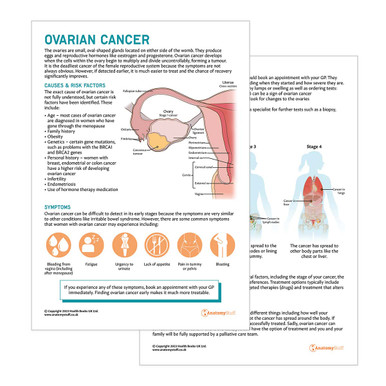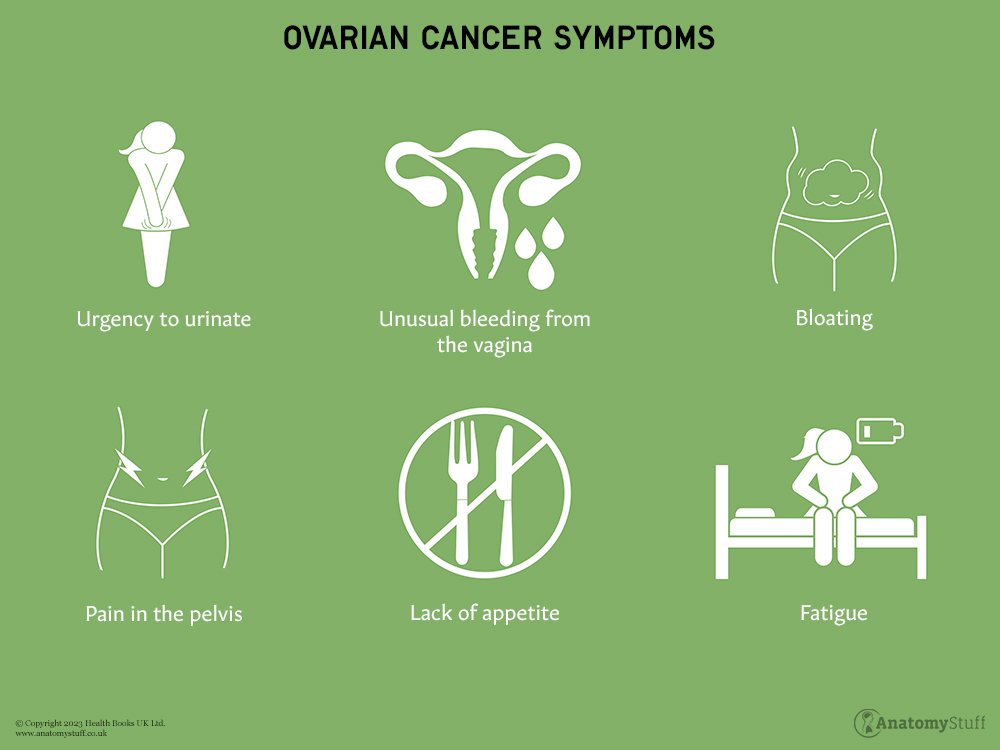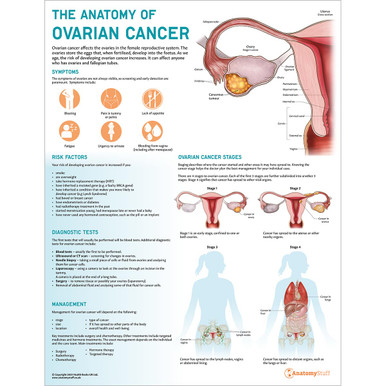Symptoms of Ovarian Cancer
Ovarian cancer affects the two ovaries in the female reproductive system. Ovaries store eggs that, when fertilised, develop into the foetus. The risk of developing ovarian cancer increases with age.
With about 7,400 women are diagnosed with cancer of the ovary (ovarian cancer) each year in the UK. Unfortunately, it can affect any person with ovaries and fallopian tubes.
While symptoms are not always visible, screening is vital for early detection and further intervention.
This article will look at how you can reduce your risk and be aware of symptoms to look out for and risk factors.
What are the main symptoms of ovarian cancer?
There might be none, some or many symptoms. However, you should never wait for symptoms to develop; always keep regular screening appointments and health checks so that you’ll catch any condition, including cancer, early, thereby giving yourself the best chance.
Being aware and knowing the risk factors and symptoms may help you better understand ovarian cancer. Always seek medical advice promptly if you suspect symptoms or are unsure.
Some of the symptoms of ovarian cancer can be discrete or mixed up with other conditions.
For some extra reading take a look at our Signs and Symptoms of Ovarian Cancer PDF.
PDF Downloads
View All
Common symptoms include:
Bloating – can be confusing as bloating can happen for many reasons, such as food intolerance, eating gassy foods or drinking fizzy drinks, overeating, menstrual cycle, and more. But bloating can also be symptomatic of ovarian cancer.
Pain in the tummy or pelvis – again, pelvic or tummy (abdominal) pain can occur for multiple reasons, such as periods, back pain, kidney pain, gastritis, and so much more. If you have pain and don’t know the cause, see your GP as soon as possible.
Lack of appetite – not feeling hungry can happen to us all sometimes. It might be that you are not simply getting enough fresh air to build up an appetite or for an abdominal issue. However, if you lack your normal appetite for more than a few days/weeks, it would be worth speaking to your GP for their thoughts.
The urgency to urinate – if you have suffered from urgency for some time, it might be normal for you. But if it has started for no apparent reason, check it out medically.
Fatigue – feeling exhausted and fatigued probably happens to us all from time to time, particularly at busier times in our lives. However, fatigue for no obvious reason can indicate an underlying condition.
Bleeding from the vagina (including after menopause) – any vaginal bleeding outside your period should always be checked out by a medical professional. It may turn out to be irrelevant, but don’t wait and see when it comes to bleeding. See your health professional immediately.
You might have some of these symptoms and not have any underlying issues, but a medical assessment is advised if you have symptoms or are confused about them.

Can I reduce the risk factors for ovarian cancer?
You can modify some risk factors, such as not smoking, keeping a healthy weight, and having a healthy lifestyle.
Taking hormone replacement therapy (HRT) may also be a risk factor for some; however, do talk to your healthcare professional about this before making any decisions.
Some risk factors are, however, out of our control, such as:
• Having inherited a mutated gene such as a faulty BRCA gene or those linked to Lynch syndrome – a rare genetic condition that increases your chance of developing cancer.
• Having had bowel or breast cancer
• Having endometriosis or diabetes
• Having had radiotherapy treatment in the past
• Starting menstruation young, having menopause late or never having a baby
• Having never used any hormonal contraception, such as the pill or an implant
What is the current management?
Management for ovarian cancer will depend on the stage and size of the cancer, its location and type and whether it is localised (confined to the ovary) or has spread to other parts of the body.
Maintaining a healthy lifestyle, eating well, regular exercise, and regular medical check-ups will support your overall well-being.
Treatments include surgery, chemotherapy, targeted medicines, and hormone treatments. The exact management depends on your individual case.
Related products
View All














